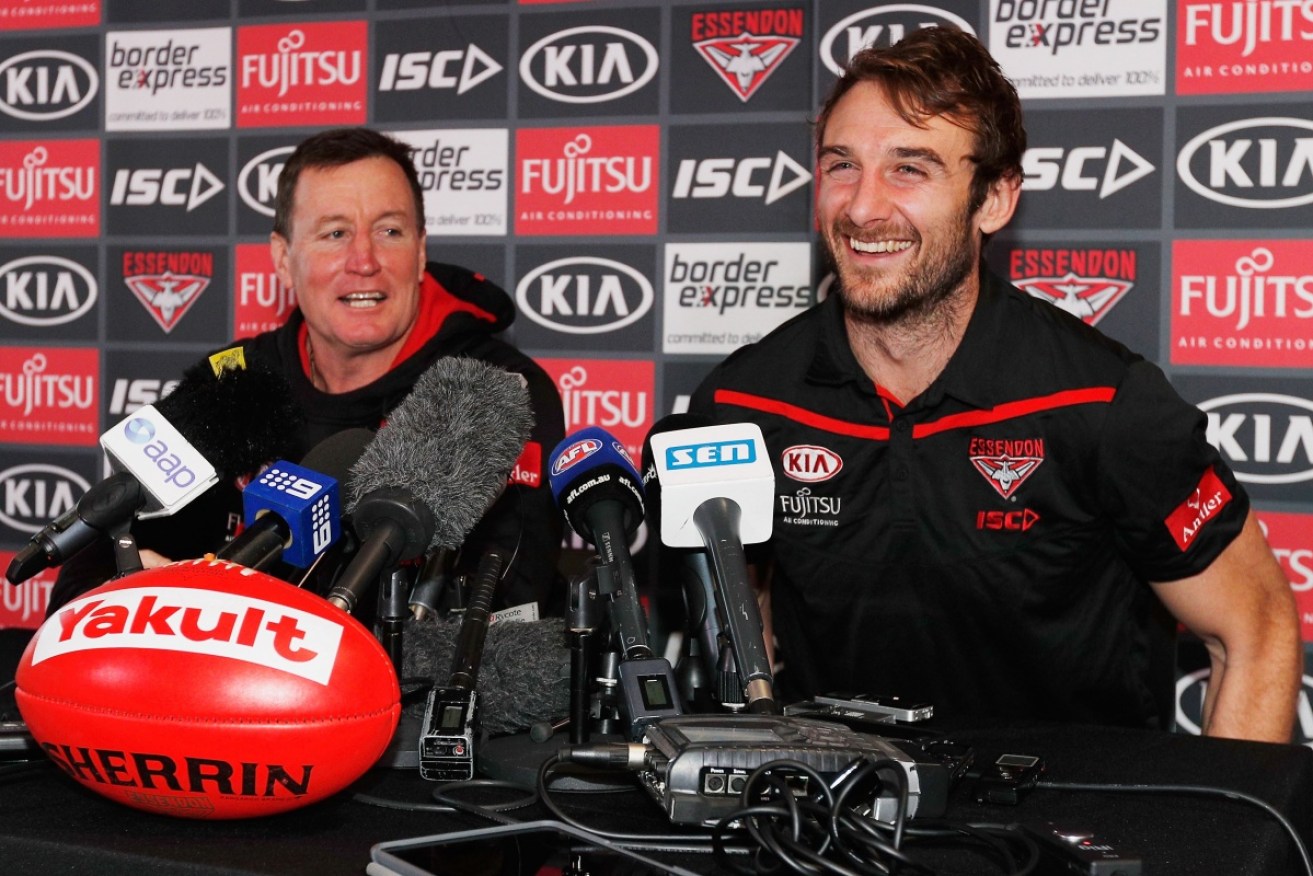Jobe Watson leaves without a Brownlow, but keeps the moniker ‘great’


Essendon coach John Worsfold (L) and Jobe Watson at the media conference where the Bomber champ announced his retirement. Photo: Getty
Jobe Watson was born into AFL football, the son of one of the game’s all-time greats.
Being the ‘son of’ has been too much of a cross to bear for many second-generation athletes, but if Jobe started his career as the son of Tim, he is ending it as an Essendon great in his own right.
In separate interviews with The New Daily, two of Watson’s former coaches – and club captains – Mark ‘Bomber’ Thompson and James Hird, praised their former charge as both a player and a skipper.
“It can’t be easy to be the son of a superstar, and the two that come to mind are Watson and (Gary) Ablett (Junior), and they’re both super players,” Thompson told The New Daily.
“He knew what he wanted to become and he probably overachieved.”
There were some doubts as to whether Watson would make it as an AFL player, let alone play over 200 games, captain his club, and win a Brownlow medal.
In his first couple of seasons, some suggested that he was only on the list because his father was a 300-game triple-premiership superstar for the Bombers.
“There was a genuine feeling that he was probably lucky to be drafted – and he’d admit that himself – but then he’s forged his own career and he’s his own player,” Thompson said.
After being drafted as a father-son selection in 2002, Watson played only one match in 2003, tallying two handballs and two tackles.
Over the next two seasons, he managed a total of 12 senior games, averaging 11 disposals a game. But things changed in 2006 when, following a pre-season which featured extensive boxing sessions under the tutelage of veteran trainer Ray Giles, Watson became a permanent fixture in the Essendon midfield, upping his output to around 24 disposals per game.
“When he came to the club, he was very talented, but from a conditioning point of view − which was my area − he wasn’t up to the same level as the young blokes who came in with him at that time,” former Essendon High Performance Manager John Quinn told The New Daily.
“We spent a lot of time getting him into shape and working on things like his speed and explosive strength.
“I’ve worked with some of the best players in the game for 17 years and I would say Jobe was one of the more committed players in terms of getting his body right.
“He knew where his weaknesses were and he worked very hard on those.”
Thompson said that hard work was typical of the determination and focus Watson displayed throughout his career.
“He was able to become an elite preparer and he obviously worked on his fitness, because he wasn’t gifted with an AFL footballer’s body, but somehow he found a way.”

Jobe Watson the day after winning the 2012 Brownlow medal, which he has since relinquished. Photo: Getty
Watson won the first of his three Crichton Medals, awarded to the Bombers’ best player, in 2009, and was named captain of the club in 2010.
Quinn, who was involved with Essendon’s leadership program, said Watson came across as articulate and grounded, virtually from day one.
“He’s very consistent in the way he not only conducts himself but the way he works with other people,” Quinn said.
“That’s one of the reasons he has been a leader, not just because he’s empathetic to other people, but because there’s a sense of surety about him.”
Thompson, who coached against Watson during his stint as coach of Geelong, said the opposition respected him enormously as an on-field leader.
“I think the way he speaks, people listen to him. In football, sometimes you’ve got to be blunt and honest and raise your voice and he did that, and other times he was really compassionate and considered.”
And there was another key voice who added to the tributes late on Wednesday, former Essendon coach James Hird, who lauded Watson as a player and captain.
“He was an absolutely champion player who rose to the surface when things got tough,” Hird said, adding: “He really led that club out of the darkness.”
Hird said “amongst the people who matter” Watson would always be remembered as a Brownlow medallist.
“And so he should be,” said Hird, “as he won it fairly.”
The Brownlow is gone – relinquished after suspension over the use of banned supplements at the club – but as he prepares to start a new chapter as a New York coffee shop impresario, Watson would be pleased to be remembered as an outstanding leader.








